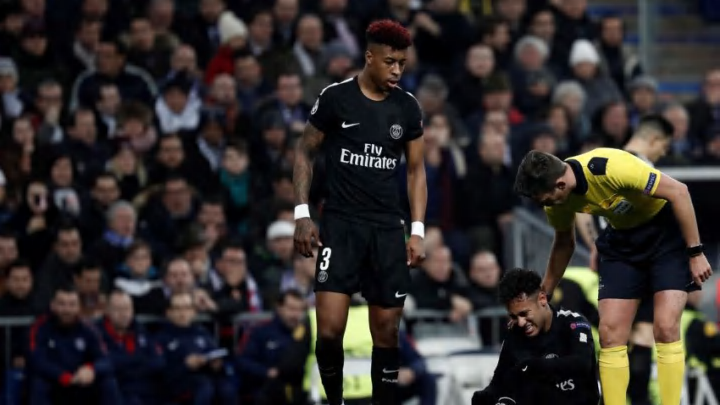PSG need to find another level to progress past Real Madrid in the Champions League. Oddly, their opponents might provide the inspiration they need.
On Valentine’s day, PSG were preparing to announce themselves on the European stage. They had brushed aside all opposition in the group stages, barring one slip up against Bayern Munich at the Allianz Arena, toppling goalscoring records with Europe’s most feared attacking trident. Ninety minutes at the Bernabeu provided a chance to make a statement to the rest of the competition and expel any lingering ghosts of their last visit to Spain.
Everyone has their own opinion as to why PSG fluffed their lines in Madrid. The overriding feeling, however, is that Les Parisiens showed that, despite all their stars and money, they’re still a cut below the European elite. Unai Emery’s team will need to find another gear in Paris on Tuesday; it’s a gear that has eluded them thus far, the one that separates talented teams from contenders, winners from losers. In that sense, they might be able to take some inspiration from their opponents.
No one in Europe can find that gear like Real. If a game could ever explain why Los Blancos are the most successful team in European soccer, then the first leg of this tie would be it. Real Madrid weren’t dominated, but they rarely looked to be the controlling force either. Indeed, for most of the second half, it was PSG who looked more likely to score.
The game was beginning to turn into a very familiar sight for Madridistas this season: a competitive first half, followed by a collapse in the second. But Real broke the norm and found a way to win on the biggest stage. Few who have watched the Champions League over the past half-decade would be surprised the 12-time winners found that gear in their favorite competition.
But it wasn’t always like this for Madrid. In the early 1990s, Real looked eerily similar to their French opposition. They hadn’t won the European Cup in over 30 years and the sweet taste of league titles and Spanish cups had long since turned bitter for Madridistas. They were tired of Spain’s biggest prizes; it was Europe they had their eyes on.
Going into the new decade, Madrid’s best team in a generation was finishing its cycle, while Barcelona were just starting a dream team of their own under Johan Cyruff. Add in a rampant Milan under Fabio Capello and a dazzling Juventus with Zinedine Zidane pulling the strings and one had to wonder if Real had missed their chance at European glory. At home, Los Blancos never convinced. When the European Cup transitioned into the Champions League, it took Madrid three tries just to qualify.
By the 1997-98 season, Madrid had qualified for Europe’s premier tournament just three times in the previous eight years. That season they finished fourth in the league and were a club in the middle of a deep crisis. The only bright side, ironically, was their European campaign, where they knocked out the holders and reached their first final since 1981. After a horrific season, they entered the showpiece as massive underdogs against a Juventus team that was in its third final in a row and looking for a second title in that same span. Despite the odds stacked against them, Madrid found a way, winning the final thanks to a goal from Yugoslavian forward Pedrag Mijatovic, who had scored just a single goal en route to the final and was also playing with an injury, further adding to the drama. It wasn’t pretty, but Madrid had found a way to win, as they’ve made a habit in the 20 years since.
There have been further droughts and hardships for Real since that dramatic night, and it’s near impossible for any side to consistently challenge for the Champions League over the course of 20 or 30 years. The final in Amsterdam was important for different reasons. As Manolo Sanchis said, the win “put the clock back to zero” and no Madrid side will ever have to face the pressure that Sanchis team faced. Instead, conquering Europe in the face of all that pressure gave Los Blancos the tools to kick on and return to the top of European soccer. They’re now the most successful team in Champions League history and became the first ever side to win back-to-back titles.
Next: The best player of all time for each Premier League team
Domestic struggles have continued at the Bernabeu since then. Real have won just six league titles since 1998, but something had clicked in the Champions League. They’d taken just a single point off Valencia in two league fixtures before running out 3-0 winners to secure their eighth European title in Paris. Atletico Madrid received similar treatment in 2014 and 2016. Between the 2014 final in Lisbon and their most recent European meeting, Real Madrid won just a single Madrid derby in the league (3-0 win in 2016-17), yet they’ve lost just a single European fixture against their derby rivals. Atleti’s only victory came last season in the Calderon and it wasn’t enough to stop Real from ending Los Rojiblancos‘ Champions League hunt for a fourth successive season.
It’s been 20 years since that night in Amsterdam, and PSG, without their talisman, Neymar, and 3-1 down to a side that have won the tournament three times in the last four years, will need to find the gear Real found two decades ago. In this competition, it seems real champions are made when the odds are against them.
